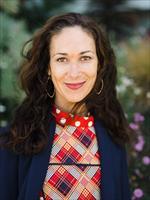School of Medicine Faculty Interview: Meghan Morris, PhD, MPH
 Tell me about your role at UCSF.
Tell me about your role at UCSF.
I am an epidemiologist engaged in research at the intersection of social justice and infectious disease transmission. I enjoy engaging diverse partners in the development of evidence-based policy to reduce social inequalities and improve health among underserved communities.
As an Assistant Professor in the Department of Epidemiology and Biostatistics, my research focuses on applying epidemiological methods to study the impact of individual, social, and structural factors on disease transmission within marginalized populations. In particular, my work has focused on using qualitative and quantitative methods to examine social determinants of health within persons who use drugs, including those infected with HIV and hepatitis C infection (HCV), worldwide.
I joined UCSF in 2012 to expand my training as an infectious disease epidemiologist, by working with hepatitis C virus researchers. A few characteristics make hepatitis c virus disease dynamics especially interesting for population scientists like myself. Compared to HIV, hepatitis C virus is more infectious meaning the virus can be transmitted more easily through the sharing of injecting equipment. Also, roughly 1 in 3 people’s immune systems will clear their hepatitis C virus infection, naturally. The virus-host interaction is fascinating. But I quickly realized that it's the social aspects of things that influence hepatitis C virus transmission dynamics. My research program considers the structural, social, and interpersonal contexts and relies on data across multiple levels to understand why some groups continue to be at risk for infection, while others do not.
October is Diversity Month! Tell me about your work as a John A. Watson Faculty Scholar, and your goals for the future of your work.
It’s terrific to be a part of the movement at UCSF toward a more diverse and equitable university. The Watson Scholars are one example of individuals working in concert toward this goal. Over my three-year tenure as a Watson Scholar, I helped establish the Department of Epidemiology’s diversity committee and champion a set of priorities focused on staff, trainee and faculty enrichment. For example, members approached a national society to encourage mentorship of undergraduate scholars from underrepresented backgrounds, to enhance diversity in graduate training for public health and a long-term benefit for the field and our department’s Ph.D. program.
The Watson scholarship provided me the time to dedicate to this initiative and also the self-confidence to take on a leadership role within a city-wide initiative called End HepC SF. In 2016 San Francisco developed a collective impact initiative aimed at eliminating hepatitis C virus as a public health threat. In the past two years, a dedicated group of roughly 35 core members across academic, public health, social and medical service organizations, and private industry have made considerable advances, including expanding community-based HCV testing services by 50% and treating over 1,000 people in primary care facilities and jail settings. We were the first city to estimate the overall burden of disease at 12,000 people with an active infection. Having a baseline number of the people living with HCV infection means we can assess progress toward elimination. It’s incredible to work on something you know you can accomplish. We have the tools to eliminate the disease!
What is your hope for the future of diversity, equity and inclusion at UCSF, and what is your personal commitment to advancing this cause?
The ideal future has our leadership reflect the demographics of the San Francisco community. This is going further than reflecting our patient population. I hope UCSF leadership will expand financial support of community-based education opportunities. For example, curriculum-based adult education to allow people in the community to take classes for a low fee or a partnership with San Quentin for virtual classroom-based learning. Both examples provide a new platform for our faculty, staff, and trainees to interact with community members for shared teaching.
I am really excited about how the media is acknowledging the social justice movement again and UCSF’s commitment to a human rights focused agenda. It’s an excellent opportunity for researchers to highlight evidence-based opportunities to reduce health disparities. We have a chance to participate in Diversity, Equity, and Inclusion Champion training here at UCSF and many of the participants to-date are women and minority members. As much change as I see at UCSF, it is discouraging to see that members of our community that represent majority groups are not being held to the same standards of embodying the PRIDE values as URM groups, and I hope that changes. I believe that by changing the reward system at UCSF, we will see a shift in leadership demographics, but these things take time and concerted effort.
I am really committed to working in partnership to promote diversity and advance equity. Our first cohort of Watson Scholars is an excellent example of how the continued sponsorship and advocacy we try to provide to each other has helped maximize our potential. It is inspiring to see the forward momentum that is coming from the Watson Scholars.
Thank you, Meghan!
